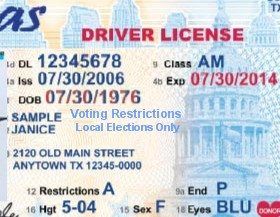Politics & Government
Voter Suppression Laws: Green Cards for Citizens?

In the last two years, since the Republican sweep in the 2010 elections, GOP-controlled legislatures in many states have passed laws requiring photo identification for voters. It is widely believed that the unspoken intent of these laws is to suppress voting by groups known to be friendly to Democrats, such as African-Americans, Latinos, poor people, and young people. In a possible miscalculation, the Republicans also make it more difficult for seniors, a group that has recently trended more Republican.
Pennsylvania, has one of the toughest photo ID laws. A person must have a photo ID, such as a valid Pennsylvania driver’s license, a valid U.S. passport, or an ID issued by a Pennsylvania higher education institution or nursing home (with an expiration date). If the potential voter has none of these, s/he can obtain a state-issued card from the Department of Transportation. To do that, one must go to one of the agencies equipped to issue such cards, when they are open (Selinsgrove is the closest to Lewisburg, about 12 miles, and is open 8:30-4:15 on Tuesday, Wednesday, Friday and Saturday).
You must fill out a lengthy application, and bring at least the following:
- Social Security card;
- birth certificate with raised seal, certificate of U.S. citizenship or naturalization, or U.S. passport;
- two proofs of residency such as tax records, lease agreements, utility bills, or a current weapons permit.
The photo ID should then be issued free of charge if the applicant certifies that it is for voting, but there have been numerous documented instances where the applicant was charged.
Many registered voters may lack both a valid photo ID and the requisite documents for obtaining one. Getting the requisite documents takes both time and money, and may not even be possible in some cases. The law manifestly discriminates against people without driver’s licenses, since it requires them to travel long distances to the DOT facilities. People who move frequently from state to state will be serially disadvantaged as compared with those who stay in one place, because different states will have different requirements. Women who change their names with their marital status will be disadvantaged relative to men.
Most fundamentally, laws like Pennsylvania’s transform the right to vote to a privilege: The burden of proof is on the voter.
It need not be this way. Most democracies have photo IDs for every citizen, issued either by the national government or by states or provinces under federal regulation. There is no reason every child born and every immigrant naturalized could not have a photo ID that would contain basic information, such as age and residency.
The card could be renewable periodically like a passport, and updated as the citizen moves. Such an ID, automatically available to every citizen and to no one else, could be equivalent to voter registration in the voter’s home district. One would be registered by virtue of being a citizen.
Now, that’s a photo ID that would enhance democracy, not restrict it.
John Peeler is a retired professor of political science at Bucknell University, specializing in Latin American and international affairs. This post first appeared on LA Progressive.

-

 The SlickJanuary 23, 2026
The SlickJanuary 23, 2026Yes, the Energy Transition Is Coming. But ‘Probably Not’ in Our Lifetime.
-

 The SlickJanuary 27, 2026
The SlickJanuary 27, 2026The One Big Beautiful Prediction: The Energy Transition Is Still Alive
-

 Column - State of InequalityJanuary 29, 2026
Column - State of InequalityJanuary 29, 2026Are California’s Billionaires Crying Wolf?
-

 Latest NewsFebruary 3, 2026
Latest NewsFebruary 3, 2026Amid the Violent Minnesota Raids, ICE Arrests Over 100 Refugees, Ships Many to Texas
-

 Dirty MoneyJanuary 30, 2026
Dirty MoneyJanuary 30, 2026Amid Climate Crisis, Insurers’ Increased Use of AI Raises Concern For Policyholders
-

 Featured VideoFebruary 4, 2026
Featured VideoFebruary 4, 2026Protesters Turn to Economic Disruption to Fight ICE
-

 The SlickFebruary 2, 2026
The SlickFebruary 2, 2026Colorado May Ask Big Oil to Leave Millions of Dollars in the Ground
-

 Column - State of InequalityFebruary 5, 2026
Column - State of InequalityFebruary 5, 2026Lawsuits Push Back on Trump’s Attack on Child Care

